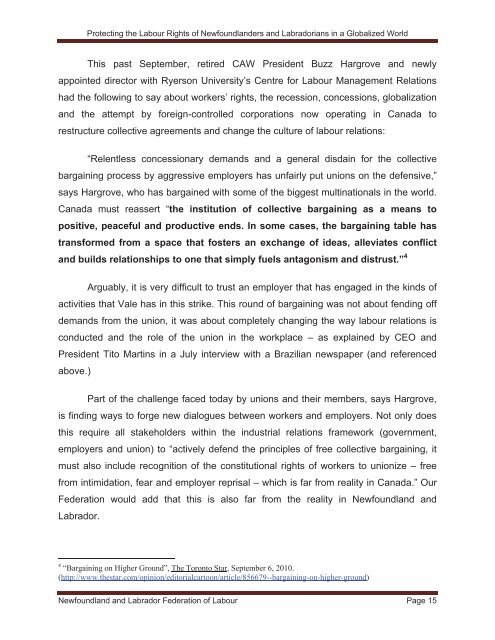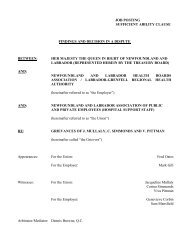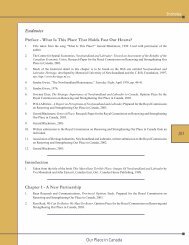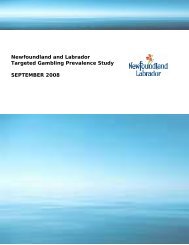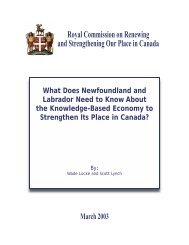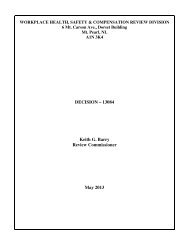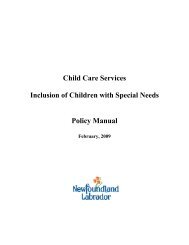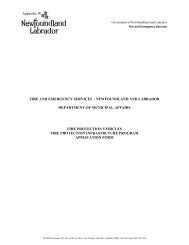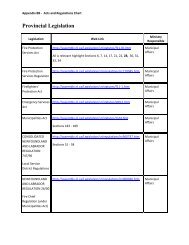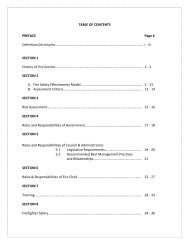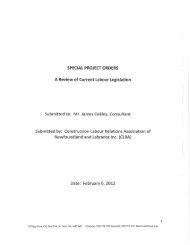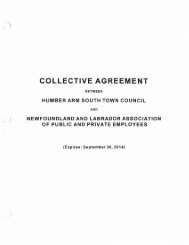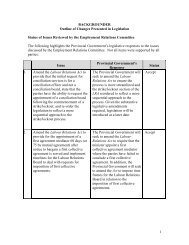January 7, 2011 - Government of Newfoundland and Labrador
January 7, 2011 - Government of Newfoundland and Labrador
January 7, 2011 - Government of Newfoundland and Labrador
You also want an ePaper? Increase the reach of your titles
YUMPU automatically turns print PDFs into web optimized ePapers that Google loves.
Protecting the Labour Rights <strong>of</strong> <strong>Newfoundl<strong>and</strong></strong>ers <strong>and</strong> <strong>Labrador</strong>ians in a Globalized World<br />
<br />
This past September, retired CAW President Buzz Hargrove <strong>and</strong> newly<br />
appointed director with Ryerson University’s Centre for Labour Management Relations<br />
had the following to say about workers’ rights, the recession, concessions, globalization<br />
<strong>and</strong> the attempt by foreign-controlled corporations now operating in Canada to<br />
restructure collective agreements <strong>and</strong> change the culture <strong>of</strong> labour relations:<br />
“Relentless concessionary dem<strong>and</strong>s <strong>and</strong> a general disdain for the collective<br />
bargaining process by aggressive employers has unfairly put unions on the defensive,”<br />
says Hargrove, who has bargained with some <strong>of</strong> the biggest multinationals in the world.<br />
Canada must reassert “the institution <strong>of</strong> collective bargaining as a means to<br />
positive, peaceful <strong>and</strong> productive ends. In some cases, the bargaining table has<br />
transformed from a space that fosters an exchange <strong>of</strong> ideas, alleviates conflict<br />
<strong>and</strong> builds relationships to one that simply fuels antagonism <strong>and</strong> distrust.” 4<br />
Arguably, it is very difficult to trust an employer that has engaged in the kinds <strong>of</strong><br />
activities that Vale has in this strike. This round <strong>of</strong> bargaining was not about fending <strong>of</strong>f<br />
dem<strong>and</strong>s from the union, it was about completely changing the way labour relations is<br />
conducted <strong>and</strong> the role <strong>of</strong> the union in the workplace – as explained by CEO <strong>and</strong><br />
President Tito Martins in a July interview with a Brazilian newspaper (<strong>and</strong> referenced<br />
above.)<br />
Part <strong>of</strong> the challenge faced today by unions <strong>and</strong> their members, says Hargrove,<br />
is finding ways to forge new dialogues between workers <strong>and</strong> employers. Not only does<br />
this require all stakeholders within the industrial relations framework (government,<br />
employers <strong>and</strong> union) to “actively defend the principles <strong>of</strong> free collective bargaining, it<br />
must also include recognition <strong>of</strong> the constitutional rights <strong>of</strong> workers to unionize – free<br />
from intimidation, fear <strong>and</strong> employer reprisal – which is far from reality in Canada.” Our<br />
Federation would add that this is also far from the reality in <strong>Newfoundl<strong>and</strong></strong> <strong>and</strong><br />
<strong>Labrador</strong>.<br />
<br />
4 “Bargaining on Higher Ground”, The Toronto Star, September 6, 2010.<br />
(http://www.thestar.com/opinion/editorialcartoon/article/856679--bargaining-on-higher-ground)<br />
<strong>Newfoundl<strong>and</strong></strong> <strong>and</strong> <strong>Labrador</strong> Federation <strong>of</strong> Labour Page 15


